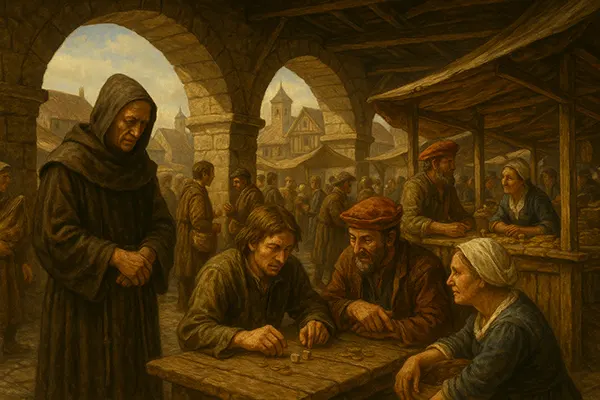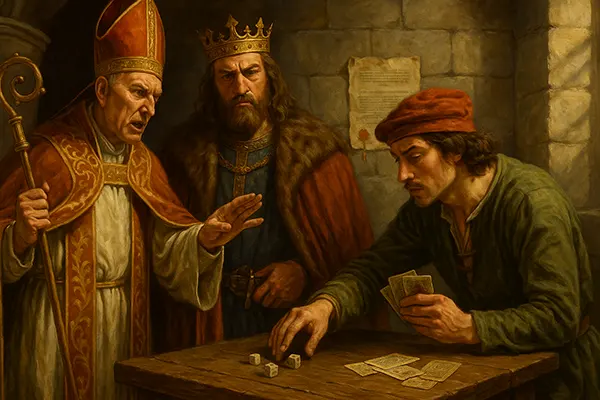During the Middle Ages, gambling was not just a pastime but a moral and social dilemma that divided Europe. Dice, cards, and betting attracted nobles, soldiers, and peasants alike, yet both the Church and royal authorities viewed these practices as dangerous. What began as innocent amusement often turned into obsession, leading to conflicts between religious morals, royal decrees, and human desire.
The Church’s Condemnation of Gambling
Throughout medieval Europe, the Church maintained a strict position against gambling. It was viewed as a sin because it encouraged greed, deceit, and idleness. Many priests condemned dice games as a temptation of the devil, warning believers that such habits could lead to damnation. Church councils in cities such as Paris, Avignon, and Rome regularly issued decrees forbidding clerics and laypeople from participating in wagers.
In the 13th century, papal orders strengthened these prohibitions, extending them to monasteries and even crusaders. Clergy caught gambling could lose their positions, while ordinary citizens risked excommunication. Religious writers of the era, such as Thomas Aquinas, described gambling as morally corrupt because it relied on chance rather than honest labour, which, in the Church’s eyes, violated divine order.
Nevertheless, the popularity of games persisted. Even within monastic walls, monks secretly rolled dice, despite the threat of punishment. This hypocrisy illustrated how deeply ingrained the human attraction to risk and reward was, regardless of religious authority.
Faith Versus Human Nature
The Church’s constant struggle against gambling reflected its broader attempt to control human behaviour. Preachers spoke of self-restraint and moral purity, yet the thrill of uncertainty remained irresistible to many. Sermons often linked gambling to other vices, such as drinking and theft, portraying it as a gateway to sin. However, history reveals that prohibitions rarely eradicated the habit—they only forced it into secrecy.
Medieval theologians faced a paradox: while condemning gambling, they also recognised that human nature sought excitement and escape from hardship. The Church’s moral rigidity often clashed with the realities of daily life, where peasants and soldiers looked for simple joys amid poverty and war. This conflict exposed the limits of religious authority when it came to controlling personal desires.
By the late Middle Ages, some local bishops adopted a more practical approach. Instead of total bans, they promoted moderation, acknowledging that gambling was an inevitable part of social life. This shift hinted at the growing awareness that moral discipline alone could not suppress human impulses.
Royal Decrees and Public Order
Kings and queens of medieval Europe were equally troubled by the spread of gambling. Beyond moral concerns, rulers feared its social consequences—soldiers losing pay, citizens neglecting work, and disputes escalating into violence. Monarchs issued edicts banning dice and cards, particularly among military ranks and during religious holidays. The aim was to maintain order and discipline rather than enforce virtue.
For example, in 1388, King Richard II of England prohibited all forms of gambling among his troops, threatening fines and imprisonment. Similar decrees were issued in France, where King Charles VI forbade gambling in taverns and city squares. These royal restrictions reflected not only moral anxiety but also the desire to prevent unrest and maintain economic stability.
Yet enforcement proved challenging. The popularity of gambling meant that even members of the aristocracy ignored the law. Royal courtiers often gambled behind closed doors, making the king’s moral stance appear hypocritical. In many cases, rulers themselves were known to place bets, turning public condemnation into private entertainment.
Law, Hypocrisy, and Control
The contradictions between royal policies and private behaviour highlighted a deeper truth about medieval governance. Laws were designed to control appearances rather than eliminate vice. Gambling became a symbol of broader tension between authority and personal freedom, where rulers imposed restrictions they could not fully follow themselves.
Economic motives also played a role. Monarchs saw in gambling an opportunity to collect fines and taxes, effectively turning prohibition into profit. Some rulers allowed betting under strict conditions, using licences to generate revenue for wars or public works. Thus, the moral argument often masked practical interests.
By the dawn of the Renaissance, gambling had become an accepted, though regulated, feature of European life. The Church continued to condemn it, but royal courts treated it as a social habit to be managed rather than eradicated. This shift marked the beginning of a more pragmatic attitude towards human behaviour and governance.

Morality, Economy, and Human Instinct
The struggle over gambling in the Middle Ages was not just a matter of law or faith—it revealed a profound conflict between moral ideals and human instincts. Both the Church and the Crown sought to impose discipline, yet neither could suppress the attraction of chance. Gambling, in many ways, reflected the medieval human condition: torn between divine obedience and earthly desires.
Economically, gambling played a hidden yet significant role. While condemned publicly, it circulated money among different classes and often funded taverns, inns, and markets. In some towns, local authorities turned a blind eye because gambling supported economic activity. Thus, what was officially sinful became unofficially tolerated.
Morally, the game table represented both temptation and escape. For the poor, it was a rare moment of equality with nobles; for the rich, it was entertainment cloaked in risk. Despite centuries of bans and sermons, gambling endured, proving that the human thirst for uncertainty cannot be legislated away.
The Enduring Legacy
Even today, echoes of medieval prohibitions remain visible in the way modern societies regulate gambling. Many countries balance moral caution with economic interest, much like medieval kings and bishops once did. The old struggle between control and desire continues in new forms—through laws, ethics, and individual choice.
Historians see this era as a mirror of the timeless tension between authority and pleasure. The medieval Church and monarchs may have lost their battle against dice and cards, but their efforts shaped Europe’s moral framework for centuries. The history of forbidden games teaches that human nature always finds ways to challenge restrictions.
Ultimately, the story of gambling in the Middle Ages is not about prohibition—it is about persistence. Faith and law may attempt to dictate behaviour, but the desire for risk, reward, and excitement remains an inseparable part of human life, regardless of time or decree.

